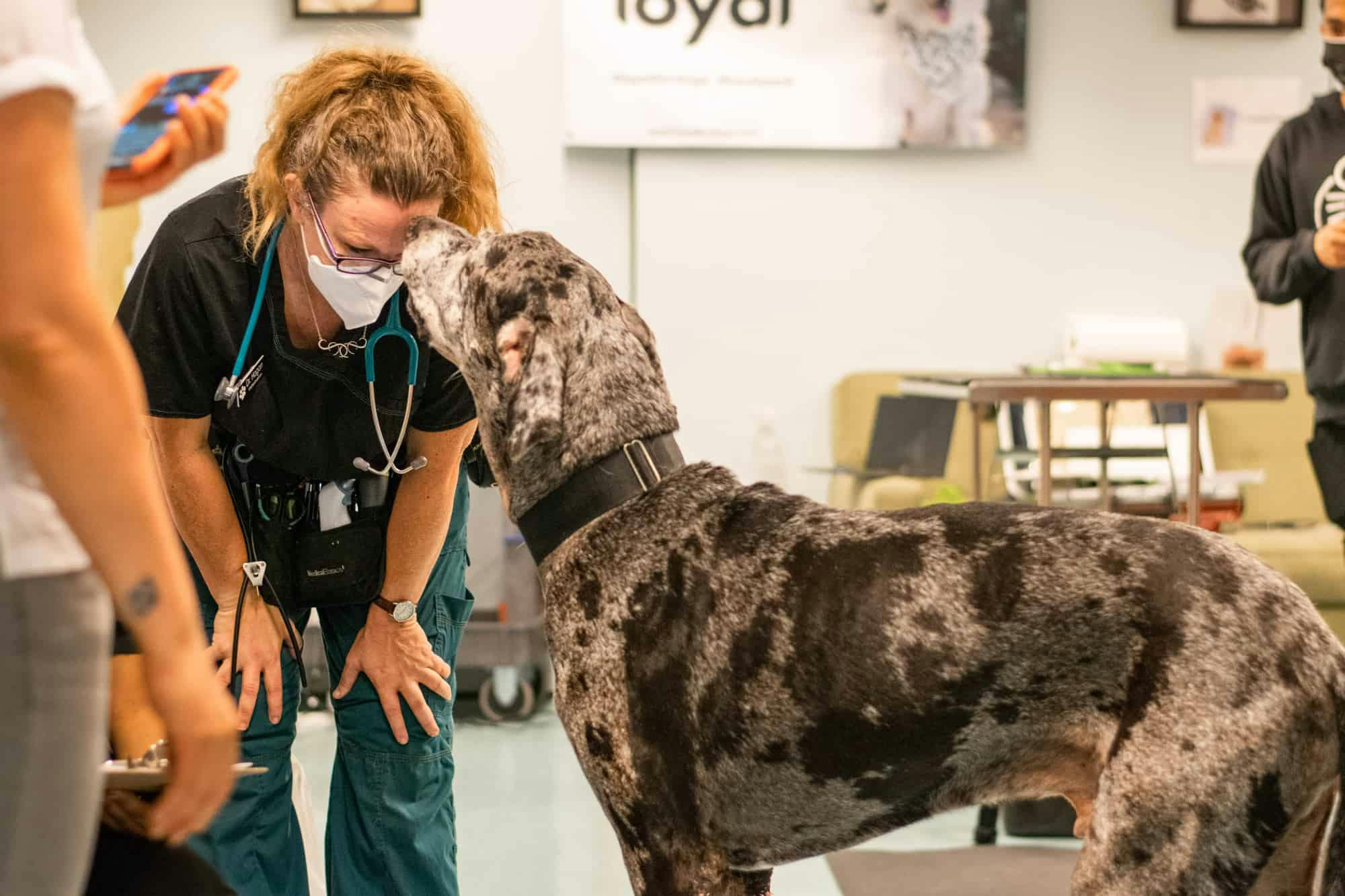Four years ago I founded Loyal with a simple vision — to bring to market the first drug explicitly approved and labeled for healthy lifespan extension. Loyal was only a few months old and about five people when we decided to begin by targeting the abnormally short lifespan of large breed dogs with a drug program we code-named LOY-001.
Today, I’m so proud to announce that Loyal has earned what we believe to be the FDA’s first-ever formal acceptance that a drug can be developed and approved to extend lifespan. In regulatory parlance, we have completed the technical effectiveness portion of our conditional approval application for LOY-001’s use in large dog lifespan extension.
As there was no established regulatory path for a lifespan extension drug, we had to design from scratch a scientifically strong and logistically feasible way to demonstrate efficacy of an aging drug. This process took more than four years, resulting in the 2,300+ page technical section now approved by the FDA. It included interventional studies of LOY-001 in an FDA-accepted model of canine aging and an observational (no-drug) study of 451 dogs.
Our interventional studies with LOY-001 showed that the drug improved clinically-relevant aging parameters. We assessed these in laboratory studies using a dog model that represents accelerated aging. We then correlated those results with quality of life scores in the observational study, as independently measured by dog owners, and health outcomes as measured by veterinarians. This was key to show that the biological benefits of the drug are linked to clinically relevant outcomes.
From our data, the FDA believes LOY-001 is likely to be effective for large dog lifespan extension in the real world. Once we satisfactorily complete safety and manufacturing sections and other requirements, vets will be able to prescribe LOY-001 to extend the lifespan of large dogs while we complete the confirmatory pivotal lifespan extension study in parallel.
What this means for large-breed dogs
If you have a large- or giant-breed dog you may be familiar with the sad reality that these large dogs tend to live shorter lives than smaller dogs — often by half.

This is unusual — very few if any other animals have such an extreme lifespan variation within the same species. Generally, the larger a mammal is, the longer its expected lifespan — a mouse may live two to three years, while elephants can live over 60 years.
Part of this lifespan disparity comes from the process of selective breeding that “created” these dog breeds. Historical selective breeding is understood to have created genetic issues like hip dysplasia in German Shepherds and breathing issues in brachycephalic dogs. In large- and giant-breed dogs, breeding for size caused these dogs to have highly elevated levels of IGF-1, a hormone that drives cell growth. High IGF-1 effectively drives these dogs to grow large when they’re young, but high IGF-1 levels in adult dogs are believed to accelerate their aging and reduce their healthy lifespan.

LOY-001 extends lifespan in part by reducing IGF-1 to levels seen in smaller-breed dogs. The IGF-1 axis is one of the most well-studied longevity pathways. In model organisms from C. elegans to mice, reducing IGF-1 extends healthy lifespan, and increasing IGF-1 shortens healthy lifespan. In humans, certain centenarians have been shown to have genetically lower levels of IGF-1.
The breakthrough moment for Loyal was connecting the biological mechanism of big dogs’ size to their short lifespan, and recognizing the big-dog-short-lifespan phenotype may not be inherent, but instead a type of “accelerated aging disorder”.
We designed LOY–001 as a long-acting injectable administered by your veterinarian every three to six months. In parallel, through our recently-announced partnership with Crinetics, we’re also developing LOY-003, a daily pill to address this same IGF-1 over-expression.
A regulatory process that ensures safety and effectiveness
Our product strategy has always been centered on earning FDA approval. While more challenging, time intensive, and expensive, I believe achieving FDA approval is critical to demonstrating the scientific legitimacy of lifespan extension drugs.
Most people know that the FDA has a rigorous system for ensuring that pharmaceutical products are safe and effective for humans. The same is true for veterinary medications — the drugs your vet prescribes to your dog, like the Rimadyl my senior Rottweiler takes for her arthritis, have been tested extensively and are regularly monitored by the FDA Center for Veterinary Medicine.
To obtain approval to sell the drug, companies must present extensive data to the FDA in three core areas:
- Efficacy — It does what it says it will do; in our case, it extends the lifespan of dogs.
- Safety — It’s proven safe for dogs, and any side effects are well-understood and documented.
- Manufacturing — We can manufacture it at a consistently high quality, at scale.
The health and safety of dogs is our top priority in all things, and there’s no higher bar in the United States than the FDA.
Conditional approval helps us help dogs sooner
The FDA’s expanded conditional approval process allows companies to bring certain products to patients while conducting longer effectiveness studies, specifically when the product meets an important unmet need. This helps us get treatment as early as possible to older dogs who need it most.
To receive conditional approval, the product must meet the same rigorous safety and manufacturing standards as drugs that are fully approved. To stay on the market beyond the five-year conditional approval period, we must demonstrate full efficacy — in our case lifespan extension — in a pivotal study.
What this means for all dogs
Each milestone we’ve achieved in this methodical, evidence-based process has demonstrated steady progress toward our vision of helping dogs live longer and stay healthy as they age.
This one is especially important because it marks a key step toward FDA approval based on credible, carefully reviewed data.
This process will make it possible for us to bring our products into veterinary clinics everywhere, and lead the charge on a new approach to age-related disease and decline.
That will ultimately mean more healthy years for the dogs we love — and that’s why we’re here.
——————
Thank you so much to the Loyal team for your intelligence, creativity, and determination to reach today’s milestone. Current and former team members who directly contributed to this milestone include: Alex Naka, Ashley Tovar, Ben Parsons, Brennen McKenzie, Dina Juarez-Salinas, Divya Shiroor, Elena Silva, Ellen Ratcliff, Entonio Marietti, Erin McCandless, Frances Chen, Jess Graves, Jessica Austriaco, Jessie George, Julie Vaughn, Kaitlyn Super, Karen Greenwood, Katya Tucker, Matt Peloquin, Michael LaCroix-Fralish, Michelle Nelson, Phil Frankino, Tennery Carttar, and Tyler McQuade.
Thank you to our earliest investors and advisors, including but not limited to Dave Petrick, Greg Rosen, Josh Kopelman, Laura Deming, Linda Rhodes, and Taylor Greene, who believed in this crazy vision long before it was rational or sensible to do so.
——————
Here’s what the press is saying this morning:
New York Times — Could a Drug Give Your Pet More Dog Years?
WIRED — A Life-Extension Drug for Big Dogs Is Getting Closer to Reality
Business Insider — An anti-aging drug for dogs promises to win owners more time with old pets. It could be FDA-approved soon.
The Wall Street Journal — The Secrets of Anti-Aging, Gleaned From Your Dog
San Francisco Chronicle — S.F. startup that wants to help dogs live longer just got FDA backing
IFLScience — Life-Extending Drug For Big Dogs Moves One Step Closer To FDA Approval
USA Today — Extending dog years: New drug to increase lifespan of dogs, company awaiting FDA approval

